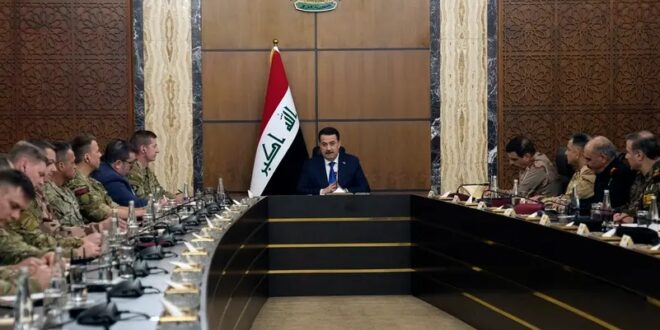Iraq sits at a geostrategically significant location in the region and having influence and presence there is very important, says former CENTCOM commander
The US military has been bombing Iran-backed targets in three different Middle East countries over the last few weeks, but this hasn’t changed the calculus of Tehran and proxies it backs from aiming to end the presence of American troops in the region.
And despite more than 170 Iran-backed attacks on US troops in Iraq, Syria and Jordan since October, current and former American officials say there is no imminent plan for any withdrawal of US forces.
Additionally, the US has killed at least two Iran-backed Iraqi militia commanders in Baghdad in the first two months of this year. The latest operation killed Abu Baqir al-Saadi, who was reportedly responsible for Kata’ib Hezbollah’s drone program.
Baghdad’s top officials quickly condemned the American strike and accused Washington of “irresponsibly” hindering the start of bilateral talks to discuss the future of US-led anti-ISIS troops in the country.
The military spokesman for Iraq’s premier, Mohammed Shia al-Sudani, accused the US of showing “no regard” for civilian lives or international laws after the Wednesday attack. No civilian casualties were reported, according to the Pentagon. Video of the aftermath of the attack shows a precision strike using what appeared to be a single Hellfire missile on the vehicle that Kata’ib Hezbollah officials were in.
An Iraqi diplomat based in a Western capital played down the willingness of Iraqi officials, including the prime minister, to drive out US forces.
“The fight against ISIS is still real, and we’ve seen several attacks over the last few months by the group,” the diplomat, who spoke on condition of anonymity, told Al Arabiya English. Addressing the public calls from Baghdad for US troops to leave, the diplomat said the overwhelming majority of those calls were from Iran-backed factions and militias.
“But they do not have popular support in Iraq because of their history in corruption, theft, and the militia economy. By engaging in issues such as the resistance axis or resisting the US presence, they avoid popular discontent and gain popular legitimacy,” the diplomat said.
US responses came after the Iran-backed attacks and the killing of three US soldiers. The militias – armed, funded and trained by Tehran over the years – said the attacks would continue until a ceasefire was reached in Gaza. No attacks have been recorded on US troops since Feb. 4, making it the longest period with no attacks since Oct. 17. There were two, four-day lulls in November and December.
Formal talks on future of US troop presence
US and Iraqi officials agreed last year to begin talks about the future shape and role of an international coalition to defeat ISIS, which is present at the invitation of the Iraqi government.
The first round of discussions was held in January but was quickly halted due to the deadly attack on US troops in Jordan, which US officials said had the fingerprints of Kata’ib Hezbollah.
Less than 24 hours after the US killed a senior Kata’ib Hezbollah commander, Iraq unilaterally announced a second round of talks with the US would be held on Feb. 11. The US quickly put out a statement confirming the talks.
What exactly is being discussed will result in a mutual decision made by both sides on the future of US and Coalition troops in Iraq.
“These talks focus on three areas of assessment: the threat of ISIS, the operating environment, and Iraqi Security Forces capability,” Pentagon Spokesman Maj. Pete Nguyen said.
Nguyen added that the ongoing discussions were an important step along the path of transition.
Previously, the US changed its role from combat to assist and advise. Potential changes in the future could include reducing the number of troops or changing the type of US or Coalition forces in Iraq.
This is all being discussed in the Higher Military Commission (HMC).
“The talks in Iraq serve to reaffirm the Coalition commitment to not only support the Iraqi Security Forces and prevent ISIS resurgence but to further secure the future of Iraq,” Nguyen told Al Arabiya English.
The former head of the US Central Command (CENTCOM), which is responsible for US military operations in the Middle East, said American military presence in Iraq supports Washington’s national security interests.
Retired Gen. Joseph Votel cited ISIS and preventing them from being a broader threat to the region and the globe as one example.
“More importantly, however, having a good relationship with the country of Iraq and especially with their capable military forces is in our interests. Iraq sits at a geostrategically significant location in the region and having influence and presence there is very important,” Votel told Al Arabiya English.
Syria troop presence tied to Iraq
The US has an estimated 900 US troops in Syria as part of the defeat-ISIS campaign. They have come under attack dozens of times over the last several months, but most of the soldiers there get support from comrades in Iraq.
Votel said any withdrawal from Iraq would most likely mean the departure of US troops from Eastern Syria. “Most of the lifelines to support our troops in Syria come from Iraq – so I assess a departure from Iraq would lead to a departure from Syria.”
However, the US troops at Al-Tanf may be able to stay since their support is less dependent on Iraq. The other forces are in the northeast.
Asked about Syria, Nguyen said: “There are no US force posture changes in Syria.”
 Eurasia Press & News
Eurasia Press & News




